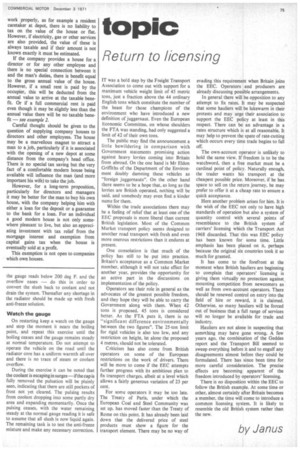topic
Page 77

If you've noticed an error in this article please click here to report it so we can fix it.
Return to licensing
IT was a bold step by the Freight Transport Association to come out with support for a maximum vehicle weight limit of 45 metric tons, just a fraction above the 44 ordinary English tons which constitute the number of the beast for those champions of the environment who have introduced a new definition of juggernaut. Even the European Economic Committee, on whose shoulders the FTA was standing, had only suggested a limit of 42 of their own tons.
The public may find the announcement a little bewildering in comparison with Government statements promising action against heavy lorries coming into Britain from abroad. On the one hand is Mr Eldon Griffiths of the Department of the Environment doubly damning these vehicles as -foreign juggernauts". On the other hand there seems to be a hope that, as long as the lorries are British operated. nothing will be said. and somebody may even find a kinder name for them.
Within the trade associations there may be a recline of relief that at least one of the EEC proposals is more liberal than current British legislation. Most of the Common Market transport policy seems designed to smother road transport with fresh and even more onerous restrictions than it endures at present.
One consolation is that much of the policy has still to be put into practice. Britain's acceptance as a Common Market member, although it will not take effect for another year. provides the opportunity for an active part in the discussions on implementation of the policy.
Operators see their role in general as the advocates of the greatest possible freedom, and they hope they will be able to carry the Government along with them. When 42 tons is proposed. 45 tons is considered better. As the FTA puts it. there is no "significant difference environmentally between the two figures". The 25-ton limit for rigid vehicles is also too low, and any restriction on height, let alone the proposed 4 metres, should not be tolerated.
Criticism has also come From British operators on some of the European restrictions on the work of drivers. There will be more to come if the EEC attempts further progress with its ambitious plan to fix transport charges, albeit at a level which allows a fairly generous variation of 23 per cent.
For some operators it may be too late. The Treaty of Paris, under which the European Coal and Steel Community was set up. has moved faster than the Treaty of Rome on this point. It has already been laid down that the delivered price of steel products must show a figure for the transport element. There may be no way of evading this requirement when Britain joins the EEC. Operators and producers are already discussing possible arrangements.
In general there will be opposition to any attempt to fix rates. It may be suspected that some hauliers will be lukewarm in their protests and may urge their association to support the EEC policy at least in this respect. There can be an advantage in a rates structure which is at all reasonable. It may help to prevent the spate of rate-cutting which occurs every time trade begins to fall off.
The own-account operator is unlikely to hold the same view. If freedom is to be the watchword. then a free market must be a cardinal point of policy. Naturally enough. the trader wants his transport at the cheapest possible price. Moreover, if he has space to sell on the return journey, he may prefer to offer it at a cheap rate to ensure a quick acceptance.
Here another problem arises for him. It is the wish of the EEC not only to have high standards of operation but also a system of quantity control with several points of resemblance to the British system of carriers' licensing which the Transport Act 1968 discarded. That this was EEC policy has been known for some time. Little emphasis has been placed on it, perhaps because the original six countries took it so much for granted.
It has come to the forefront at the moment when British hauliers are beginning to complain that operators' licensing is giving them virtually no protection against mounting competition from newcomers as well as from own-account operators. There should be renewed control on entry into the field of hire or reward, it is claimed. Otherwise, so many hauliers will be forced out of business that a full range of services will no longer be available for trade and industry.
Hauliers are not alone in suspecting that something may have gone wrong. A few years ago. the combination of the Geddes report and the Transport Bill seemed to sweep everything before it and to engulf any disagreements almost before they could be formulated. There has since been time for more careful consideration. The precise effects are becoming apparent of the freedom introduced by operators' licensing.
There is no disposition within the EEC to follow the British example. At some time or other. almost certainly after Britain becomes a member, the time will come to introduce a common licensing system. It is likely to resemble the old British system rather than the new.


































































































































